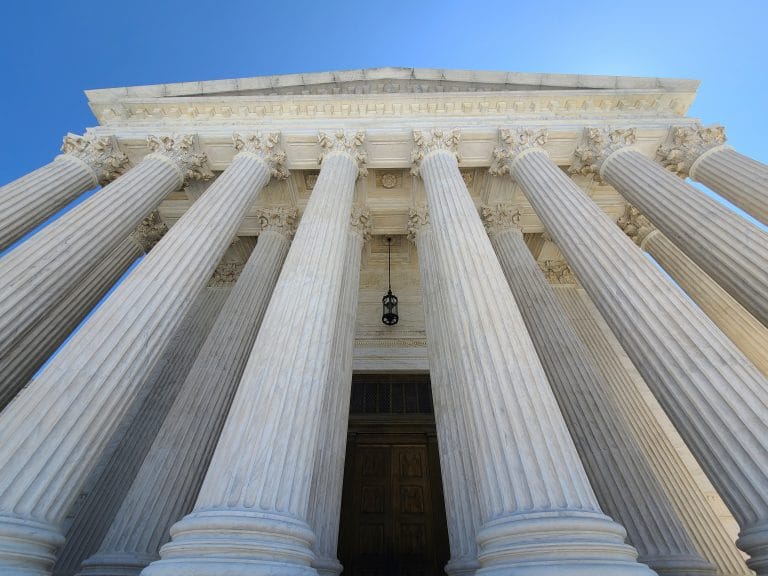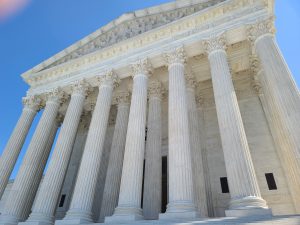The Supreme Court decided to intervene in a case that implicates gun policy. But what that decision says about where the Court is headed on the Second Amendment isn’t completely clear.
The justices gave us very little to go off of when interpreting their move in Vanderstok v. Garland. They didn’t explain why they decided to issue a stay on the ruling against the ATF’s attempt to reclassify unfinished gun parts as functioning firearms after the Fifth Circuit declined to do the same. They didn’t speak on the merits at all.
But that doesn’t mean there aren’t some tea leaves to read. The first of which is what little the Court did say.
“Application (23A82) for stay presented to Justice Alito and by him referred to the Court is granted,” the Court wrote in its order. “The June 30, 2023 order and July 5, 2023 judgment of the United States District Court for the Northern District of Texas, case No. 4:22-cv-691, insofar as they vacate the final rule of the Bureau of Alcohol, Tobacco, Firearms and Explosives, 87 Fed. Reg. 24652 (April 26, 2022), are stayed pending the disposition of the appeal in the United States Court of Appeals for the Fifth Circuit and disposition of a petition for a writ of certiorari, if such a writ is timely sought.”
So, the Supreme Court stayed the lower court’s decision to vacate the ATF’s rule. That effectively means the agency can continue to enforce its ban on selling unfinished frames and receivers, especially in kits alongside jigs designed to help build them into working guns. Moreover, the Court has determined that the ATF’s rule will remain in effect even after the Fifth Circuit panel set to hear the case has handed down its ruling.
The stay will only expire once the Supreme Court itself has considered any potential appeal request.
This is a departure from the two recent gun cases where one of the parties sought an emergency intervention. The Court rebuffed plaintiffs in NAGR v. Naperville, who asked SCOTUS to issue an emergency injunction against Illinois’ “assault weapons” ban after a district judge refused.
They did the same in Antonyuk v. Nigrelli when plaintiffs asked the Court to remove a Second Circuit stay on a lower court ruling tossing New York’s expansive “sensitive places” gun-carry restriction law. Although, Justices Samuel Alito and Clarence Thomas did indicate that was merely out of respect for the Second Circuit’s procedure.
“I understand the Court’s denial today to reflect respect for the Second Circuit’s procedures in managing its own docket, rather than expressing any view on the merits of the case,” Alito wrote.
In fact, they took time to complement the ruling against the state’s law.
“The New York law at issue in this application presents novel and serious questions under both the First and the Second Amendments,” Alito wrote. “The District Court found, in a thorough opinion, that the applicants were likely to succeed on a number of their claims, and it issued a preliminary injunction as to twelve provisions of the challenged law.”
Another departure from those cases comes with the makeup of the decision to stay the ATF’s “ghost gun” rule. Unlike those unanimous orders, this one split the conservative side of the bench. Most of the conservatives wanted to deny the stay.
“Justice Thomas, Justice Alito, Justice Gorsuch, and Justice Kavanaugh would deny the application for stay,” the Court’s order said.
But, unlike Antonyuk v. Nigrelli and NAGR v. Naperville, this isn’t a Second Amendment case. It’s a case that centers around the limits of executive agency power.
Also, the government is the one who made the emergency request in this case. And that request was for a stay instead of an injunction. Both of those points are highly relevant because, as skeptical as it may be of government power, the Supreme Court very often defers to the government in how it adjudicates cases.
If the Department of Justice is asking for the Supreme Court to take some kind of action in a case that directly impacts the enforcement of federal law, it’s very likely the Court will agree to do so. The Court obviously doesn’t always issue the ruling the government wants, but its docket is often stacked with cases where review was requested by the government.
That’s one of the reasons the Court took so long to take a Second Amendment case after 2008’s Heller and 2010’s McDonald but only a year between 2022’s Bruen and 2023’s Rahimi. The big difference between Rahimi and the slate of Second Amendment cases the Court rejected in 2019, for instance, is that the government was asking for review this time.
From that perspective, it’s a bit more surprising the Fifth Circuit declined to extend a stay to the ruling blocking the ATF’s rule than it is to see the Supreme Court issue one. The Fifth Circuit explained its reasoning for denying the stay this way:
“Because the ATF has not demonstrated a strong likelihood of success on the merits, nor irreparable harm in the absence of a stay, we DENY the government’s request to stay the vacatur of the two challenged portions of the Rule,” the panel wrote in a per curiam opinion. “This effectively maintains, pending appeal, the status quo that existed for 54 years from 1968 to 2022.”
That the Supreme Court apparently disagreed with this reasoning says something. But it’s entirely possible all it says is the Court is more skeptical about vacating the rule before the legal fight over it has ended. After all, if the six justices who agreed to extend the stay had all agreed with the DOJ on the case’s merits, they could have said so in the order.
Instead, we’re left to read the entrails of a single paragraph and make our best guess.
Weighing these factors together shouldn’t make either side of the gun debate think they know where the Court is headed on the merits of the ATF’s “ghost gun” ban. Although this wasn’t what gun-rights advocates wanted to see at this stage of the case, that doesn’t necessarily mean it says much about where the Court might come down on the merits of the rule. Or that they’ll take it up at all.






